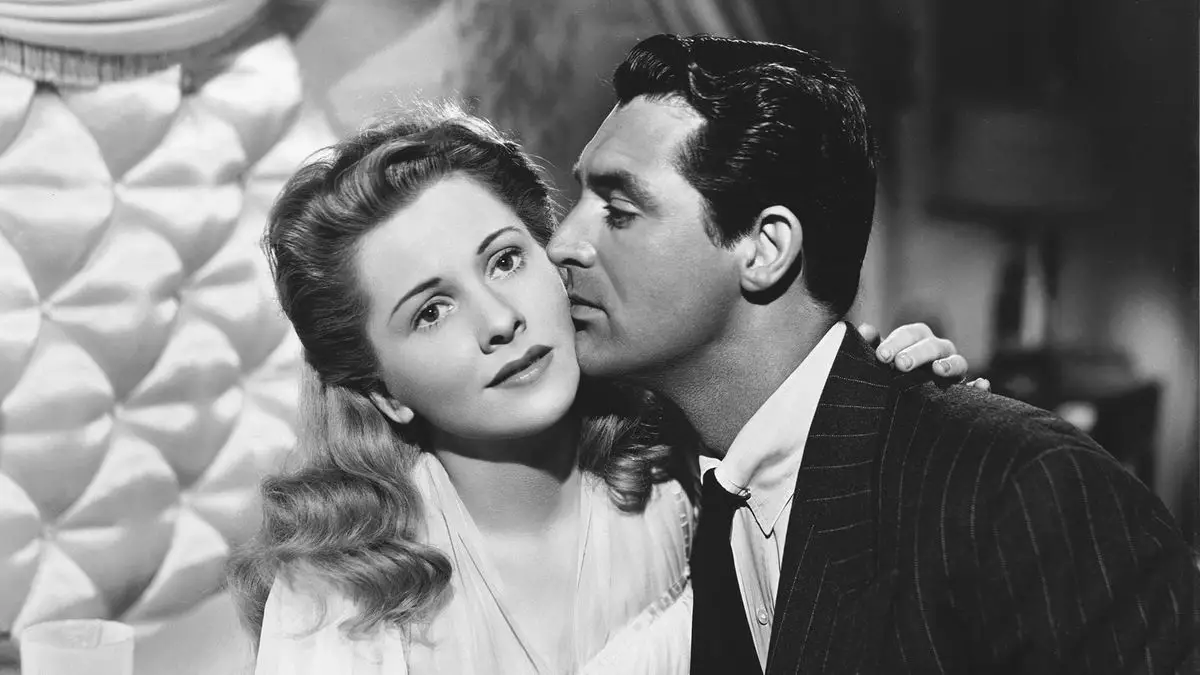
Suspicion is one of four Alfred Hitchcock films to star Cary Grant but Joan Fontaine earns the only acting Oscar in Hitchcock’s filmography.
While North by Northwest is my favorite Hitchcock film, Suspicion is where it all began for Grant’s relationship with the filmmaker. Their relationship might have started sooner but Grant’s schedule meant not being able to star in Mr. and Mrs. Smith. Given their similar backgrounds from growing up in England, it’s no surprise that they do some great work together. Hitchcock wasn’t the easiest when it came to be directed by him but Grant is one of the few that enjoyed it. This comes down to the fact that the filmmaker knew what he wanted. But as Grant’s star rose, it would mean a higher salary–at which point, he simply became too expensive for the master of suspense.
Johnnie Aysgarth (Cary Grant) meets Lina McLaidlaw (Joan Fontaine) on a train in England. Yup, it’s another Hitchcock film with a train. There’s quite a few of them. They don’t get off to the greatest start and after overhearing comments by her parents, the two kiss. You’d think that they would start dating but Johnnie quickly runs off, only to come back a week later. Lina’s father, General McLaidlaw (Sir Cedric Hardwicke), disapproves of them and after his death later in the film, one thinks that he would have left more money if he did. Meanwhile, Lina discovers the worst things about Johnny after they elope and return from their honeymoon. He isn’t working and is always borrowing money. It’s hardly the way to live but again, Johnny probably thought his father-in-law would provide for them.
Johnnie takes a job with his cousin, Captain Melbeck (Leo G. Carroll), but it doesn’t work out. He hides this from Lina and decides to start up a land development with his friend, Beaky (Nigel Bruce). Johnnie might appear to only be in it for the profits but it’s easy to see that this deal is not going anywhere. Of course, it’s not long thereafter when Johnnie accompanies Beaky halfway on his trip to Paris. Because of this, Lina thinks the worst of Johnnie, especially after police inspectors stop by the house and inform her of Beaky’s death. Could he have really killed Beaky in Paris? Not long after this, Lina finds out that Johnnie couldn’t take out a loan on an insurance policy. She starts getting this idea that Johnnie might be trying to kill her especially when he starts asking questions to mystery writer Isobel Sedbusk (Auriol Lee).
Suspicion doesn’t earn its ending of Johnny getting away with murder. Like any film in the 1940s, nobody could commit a crime on screen, or off, and get away with it. Cary Grant is not the type of actor that one roots against on the big screen because he plays heroic roles, not villains. I’ll get into this in a moment but the ending is the biggest reason why Suspicion is not any higher when one ranks Hitchcock’s filmography. It’s still a classic but the film is let down by its ending–the speeding car that nearly sees Lina falling off a cliff, only to have the two to give their marriage another chance. I can’t blame the master of suspense for complaining about the ending for the rest of his life. He didn’t really have much of a choice in the matter–more on this in a moment.
Because of the PCA, there are changes from the novel, Before the Fact, by Frances Iles. For one, Johnnie Aysgarth cannot escape the crime in the film. While officials suspect him of murder, he’s completely innocent in the film and makes Lina look paranoid as a result. The film has plenty of moments where one suspects he is a murderer and Franz Waxman’s Oscar-nominated score sells it. A lot of this has to do with Joseph Breen. Notorious for his strict enforcement of the Production Code, Breen found himself serving a brief stint as general manager at RKO. Leave it to him to leave his footprint over the final cut! If you don’t like the ending, don’t blame it on Hitchcock or the screeners. The blame lies solely on Joseph Breen!
It’s interesting to watch the progression in their films together. I can’t speak for Notorious because it’s the only Hitchcock film starring Grant that I still need to watch. Meanwhile, there is a universe where Grant stars in Dial M for Murder but leave it to Jack Warner to think audiences would not buy the screen icon as a murderer. In theory, the younger Warner brother gets no argument from me because it’s nice to watch actors displaying their range. Of course, we all know it’s really about money in the end. In any event, there are scenes here that would go onto feel out of place in the latter films. At the same time, the scenes would also feel very tame in a suspenseful thriller today.
It’s amazing to think that only one actress earned an Oscar in all of Hitchcock’s filmography. And of course, the win would come as one of the inciting incidents in a sibling rivalry. But in any event, it surprises me that Hitchcock did not direct more Oscar-winning performances. It certainly says something about the Academy, let alone the lobbying by studios at the time. If you look at the filmmaker’s output in the 1950s and 1960s, there are performances that are definitely Oscar-worthy.
Suspicion is not the best of the Alfred Hitchcock/Cary Grant films and despite the film’s ending, it’s still in the upper tier of the Hitchcock’s filmography.
DIRECTOR: Alfred Hitchcock
SCREENWRITERS: Samson Raphaelson, Joan Harrison, and Alma Reville
CAST: Cary Grant, Joan Fontaine, with Sir Cedric Hardwicke, Nigel Bruce, and Dame May Whitty
RKO Radio Pictures released Suspicion in theaters on November 14, 1941. Grade: 4/5
Please subscribe to Solzy at the Movies on Substack.




